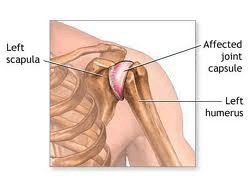Frozen Shoulder
This information is sourced from Natural Cures. Rife and Zapper frequencies are at the end of theis article.

Adhesive Capsulitis
Definition
Frozen shoulder is a painful disorder relating to the flexible tissues around the shoulder capsule (the connective tissue surrounding the glenohumeral joint of the shoulder). The condition is believed to have three stages: the “freezing”, the “frozen” and the “thawing”. Which in simpler terms is the worsening of pain and gradual loss of movement, followed by a slight ease in pain but on-going stiffness, finally the shoulder slowly returns towards normal. Each phase can be expected to last over four months.
Symptoms
Symptoms of frozen shoulder include inflammation and stiffness of the shoulder which in turn severely restricts motion and causes chronic pain. Generally the pain is constant however it can worsen when the weather is colder and at night causing sleep deprivation. This makes even small tasks, such as raising the arm, difficult if not impossible and can lead to depression and problems in the neck and back. Cramping and enormous pain can be triggered by certain movements or bumps.
Cause
The condition can last from five months to beyond three years and in some cases can be caused by injury or strain to the shoulder area. The condition can also occur spontaneously (idiopathic frozen shoulder) and may in some circumstances be linked to rheumatism or shoulder, breast and lung surgery. Additionally the condition arises when there is a lack of synovial fluid between the upper arm bone and the shoulder blade socket.
Note: Sufferers can become frustrated due to slow recovery. Frozen shoulder is more common in women than men and rarely appears in people under 40years old. It is more common in diabetics or people who have suffered from heart disease, lung disease, Parkinson’s disease, a stroke or an overactive thyroid gland.
NATURAL CURES:
Diet: Avoid eating toxins and focus on foods that heal (garlic, onions, tomatoes, digestive enzymes, sea salt) and vegetable juices. You could also try cayenne pepper to get your body sweating; a great way of getting unwanted toxins out of the body.
Liver Cleanse/Flush: When too many toxins build up in the body the liver can become sluggish and struggle to function. A liver cleanse (or several) can be effective in curing acne, high cholesterol, eczema, psoriasis, asthma, allergies, gallstones, food intolerance, shoulder pain, abdominal pain, upper back pain, arm pain, gallstones attack, liver pain, gallbladder pain, hypertension, cardiovascular diseases, heartburn, bloating, inflammatory bowel disease, IBS, colitis, constipation, cancer, AIDS, MS, Parkinson’s and Alzheimer’s disease, epilepsy, seizures, osteoporosis and angina pectoris.
Ice Treatment: Many patients have enthusiastically responded to the use of ice and found it particularly beneficial. Simply take some crushed ice, wrap it in a clean towel and place it over the front of the shoulder for approximately 10 minutes. This process should be repeated as often as possible including 10 minute resting periods. You may want to apply the ice to other parts of the shoulder where you are experiencing pain. Note: ice should never be applied directly to the skin as this may cause permanent brown scarring.
Thermotherapy / Heat application: Consider a warm bath in the early stages of frozen shoulder. In the later stages hot water bottles (not too hot) or heat packs can be applied. If you find this treatment effective think about an alternating cycle between of ice, warm, ice.
Physiotherapy: This may include massage therapy and sometimes daily extensive stretching after the heating of the shoulder. Please seek the advice of your alternative health care practitioner before undergoing these procedures to make sure they are appropriate for you.
Exercising: Overexertion in the early stages is not recommended as the muscles and joints should be allowed to rest. Gentle exercise advocated by your health care provider is an option and some people find exercising in Jacuzzis/pools useful.
Sleeping position: Some relief and comfort of the condition can be achieved through supporting the affected shoulder by placing a pillow underneath it when lying on your back. Also you can sleep on your “good side” with a pillow placed between your waist and affected shoulder.
Good Posture: The best position for recovery is to straighten the arm and let is hang at the side of the body. You should not hold the arm in a sling position across the chest as this puts stress on your tendons.
Aromatherapy: Chamomile, lavender, frankincense, and/or myrrh are all useful essential oils that can be used to reduce inflammation.
Herbs: Chamomile, lemon balm, licorice, meadowsweet, St. John’s wort, plantain, willow bark, and wild yam all have anti-inflammatory properties, as do sea cucumber and yarrow.
Zapper and Rife Frequencies: Adhesive Capsulitis: 0.06, 0.23, 20.00, 68.25, 125.75, 158.30, 357.30, 532.41, 653.69, 759.83

